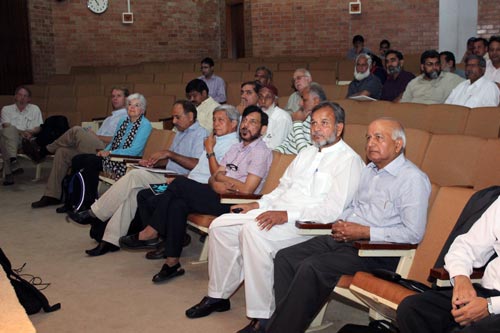 By Imtiaz Muhammad/CIMMYT
By Imtiaz Muhammad/CIMMYT
International and Pakistani scientists are expanding efforts to accelerate access to climate-resilient maize and rust-resistant wheat varieties in Pakistan, as well as to improve farmers’ access to quality seeds, as part of the Agricultural Innovation Program (AIP). Project partners discussed these priorities during a cereals and cereal systems meeting at the National Agricultural Research Center (NARC) in Islamabad from 29 to 30 August. AIP is a U.S. Agency for International Development (USAID)- funded project focusing on cereals, vegetables and livestock in Pakistan, a country challenged by rapid population growth and climate change.
CIMMYT is working with the Pakistan Agricultural Research Council (PARC), the International Rice Research Institute (IRRI) and other partners to increase agricultural productivity and the value of agricultural commodities in the country. The program is supporting Pakistan in agricultural research for development, which includes building partnerships between research and those it serves; increasing investments; generating, sharing and making use of agricultural knowledge for development; and demonstrating and building awareness of the development impact and returns from agricultural innovation. Farmers throughout the world face similar problems from increasing production costs, fluctuating market prices, water and soil degradation and potential implications of climate change, said Ken Sayre, a CIMMYT consultant on conservation agriculture. Sayre also described the benefits of conservation agriculture crop management technologies and their main principles.
These include seeding systems that allow major reductions in tillage, retaining adequate levels of crop residues on the soil surface and using diversified crop rotations. There are many challenges AIP can address. Maize yields in Khyber Pakhtunkhwa Province are low due to a lack of technology. Most maize farmers in Pakistan use manual sowing, which is not cost or time-effective, and farmers need more confidence in hybrid seeds before they will pay a premium for them. Meeting participants discussed several options for commissioned projects in wheat, including rapid diffusion of high-yielding, rust-resistant wheat; introducing fungicides for wheat management; and generating a durum wheat value chain in Pakistan. Participants also discussed potential projects and goals related to climate-resilient wheat, the cultivation of durum wheat in Balochistan province, the standardization of fungicides to combat yield losses and strengthening communication.
For the rice work plan, top priority areas include developing tolerance to submergence and heat in locally adapted varieties such as super basmati, basmati 515, IR-6 and IR 9, in addition to bacterial leaf blight resistance and superior grain quality. Abdul Rehman and Surapong Sarkarung represented IRRI, where some of the activities have already begun. Priorities for the maize work plan include introducing climateresilient maize hybrids, developing biofortified maize, developing cultivars with resistance to biotic stresses and strengthening the maize seed sector. CIMMYT maize expert R. Sadananda and national partners joined to refine the maize work plan. Kay Simmons from the U.S. Department of Agriculture (USDA)-Agricultural Research Service and Ian C. Winborne, plant health advisor for the USDA Animal and Plant Health Inspection Service at the U.S. Embassy in Islamabad, also attended the meeting to discuss wheat productivity enhancement in Pakistan.
 Capacity development
Capacity development